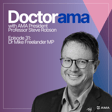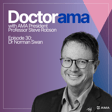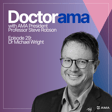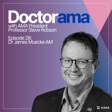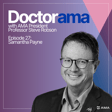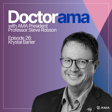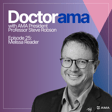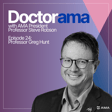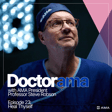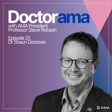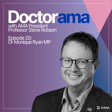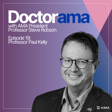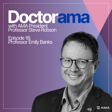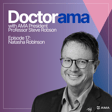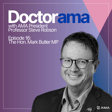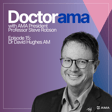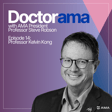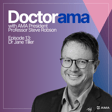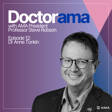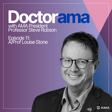Become a Creator today!Start creating today - Share your story with the world!
Start for free
00:00:00
00:00:01

Episode 22 - Professor Steve Wesselingh
In episode 22 of Doctorama AMA President Professor Steve Robson chats with Professor Steve Wesselingh.
Recommended
Transcript
Introduction to Dr Rama Podcast
00:00:00
Speaker
Well, it's one of the peak bodies for medical research in this country and running it takes a very certain person. We're going to find out who that is today on Dr Rama. You're listening to Dr Rama with Steve Robson, bringing you the best of health, medicine and people.
Guest Introduction: Prof. Steve Wesleying
00:00:20
Speaker
Well, I'm really delighted that my guest today on the Dr Rama podcast is Professor Steve Wesleying, who's CEO of the National Health and Medical Research Council. Steve, welcome to Dr Rama. Thanks for having me on. Really looking forward to it. Look, you probably don't realise we were contemporaries a little while at Flinders Medical Centre back in the early 90s. I was a trainee there.
00:00:44
Speaker
And I think we had a few consults with you, but I'm sure that length of time away, you're not going to remember me as a registrar at all. But I did. I actually spent last week in a meeting with someone you worked with a lot over a long time, and we were talking about you. I said I was recording a podcast this week, and I said, what's a question you'd like me to ask? And she said, ask him if he owns a tie.
00:01:14
Speaker
So I can honestly say I don't own any ties. And the last time I wore a tie, I think was at the Bernard Institute when I was director there, probably in my first few days at the Bernard Institute.
Early Life and Education
00:01:29
Speaker
And before that, I think it was my colleague. She thought she warned me that might be the answer, Steve. Look, it's really great to talk to you. You began your career in South Australia. You were born and raised in South Australia? Yeah, no, I grew up in
00:01:48
Speaker
St Mary's in South Australia, and as you know, very close to Flinders University, and went to Marion High School, quite a famous public high school, which has now been demolished, unfortunately. And yeah, I spent all of my youth really in South Australia. So did you support an SA NFL team in those days?
Inspiration from Papua New Guinea
00:02:10
Speaker
I did, which was South Adelaide, who I actually went on and played for, actually. Oh, right.
00:02:18
Speaker
Mainly, mainly I have to admit in the reserves, but I played, um, I played one SNFL league game and the rest of the time I was in the reserves, but we won the, my last game, um, was the grand final and we won the reserves grand final. Unfortunately, the league lost to Port Adelaide and I've, um, you know, always, um, been a crows supporter because of that. Yeah.
00:02:42
Speaker
That was going to be my next question. Are you a crowsman or a report man? Look, one of the things I always like to understand about guests on the podcast is why you've made the career choices that you've made. So what was it about infectious diseases that attracted you to the specialty? Yeah, I think it actually happened quite late in my medical school career. The advantage of Flinders was we had an opportunity to spend three months in
00:03:11
Speaker
in our sixth year going anywhere we wanted. And I decided to go to Papua New Guinea and spend 12 weeks in Mount Hagen and the area around Mount Hagen. And it was really there that I got excited about infectious diseases. I mean, it's just amazing the infectious diseases you saw. And also, I guess the lack of treatments we had and the sort of
00:03:34
Speaker
difficulties we had with treatments. And so, yeah, no, that really started me on a path of infectious diseases. And then later on, I had an opportunity to be a registrar at Garoka base hospital and, um, with, um, some amazing people there, people like Michael Alpers and others. And, um, you know, again, that triggered me to continue on in infectious diseases.
00:03:58
Speaker
Yeah, look, I've spent a little bit of time in Papua New Guinea, not the amount you have, and I've always been blown away by the extraordinary ingenuity of the doctors and the healthcare workers in PNG achieving what they do with the limited resources they often have. Was that your experience?
00:04:16
Speaker
Absolutely, and there were some amazing, amazing people there, you know, from the aid post orderlies who, you know, had six months of training and yet could treat meningitis way better than I could. And then, you know, there were people who had spent a lifetime there like Michael Alpers or Ken Cleesey, amazing Australian surgeon. And then others who came through like Michael Harari and others who
00:04:39
Speaker
But the png doctors the a post order lease the h eos health extension offices it was actually a terrific public health system. But you know relying on not necessarily relying so much on doctors but on nurses nurses giving anesthetics and so on it was yeah it was an enormous experience.
Path to Research and Academia
00:05:01
Speaker
Yeah, absolutely. There are so many challenges there with the geography and the resourcing and things. Steve, you made, I guess, a career choice to pursue research and academic work. What was it that attracted you into the more academic sphere of medical practice?
00:05:21
Speaker
I think there were probably two parts to that. One was actually training at Flinders. Flinders, at that time, was one of the first university medical schools and hospitals that were actually built in the same building in the late 70s.
00:05:40
Speaker
You know, the fact that everyone was appointed both to the university and the hospital and people like John Chalmers, you know, saw no difference between being professor of medicine and head of the department of medicine.
00:05:52
Speaker
And in fact, by the time I'd finished physician training, you know, Chalmers and Peter McDonald and others, you know, just assumed that I would do a PhD. So in some ways it was an assumption that I would do research. But the other bit of the research comes back to my time at a Groker Bates hospital, and there was a English physician called John Richards, who was really collecting data and evidence in order to have the medical care that we were delivering truly be evidence-based.
00:06:21
Speaker
you know, working out whether pelvic inflammatory disease was caused by chlamydia. No one knew whether that was the case in Papua New Guinea and so on. So that really indicated to me again that, you know, research and evidence was the way to meet those really difficult challenges. Steve, you decamped to the U.S. at some stage. Tell me about the choice why you chose to go. I think it was John Hopkins. You added that, right?
00:06:49
Speaker
Yeah, so I just finished a PhD examining viral infections of the central nervous system. And Rick Burns, a famous Adelaide neurologist, hadn't been my supervisor, but I had spent time talking to Rick about my research. And he knew Dick Johnson, who was the head of neuro-virology at Hopkins, and he suggested Hopkins.
00:07:14
Speaker
Um, and, and then I, I actually went and visited and I met Diane Griffin, who was that true. Well, Dick was, was the head of neuro virology, but Diane was doing all this amazing research there. And, uh, and she convinced me to come and work at Hopkins. And, and the other thing was this, you know, amazing hospital in the middle of a quite a poor city, Baltimore, but.
00:07:40
Speaker
who really had this sort of excellence philosophy that, I mean, they saw, they saw themselves as the best of the best. If you went to Hopkins, you had to be the best of the best. So it was really, you know, that really attracted me in that culture of excellence and, you know, a hospital, again, a university that owns its hospital and runs its hospital embedding research in health is, I guess, what attracted me.
00:08:03
Speaker
Did you find it a big adjustment going from the Australian health system to the very different US health system? Was that an adjustment or was it pretty smooth?
Experience at Johns Hopkins
00:08:14
Speaker
It was actually, um, pretty smooth really. Um, the, I, I bet I was an infection trained in infection disease, but I went to a neurology department, but you know, the neurology department had a series of wards and we had clinics and, but the labs were right next to the wards. It was a bit like Flinders in a way.
00:08:34
Speaker
And, um, and the people were wonderful and, uh, you know, I have close friends. Um, so there's one guy I was working with Justin MacArthur, who then became the head of neurology later on. And so I've known Justin for a long time and John Glass and others make them. This is one of the things I tell people I mentor or when I'm giving lectures about research is travel. I think is so important. You learn, I learned so much in Papua New Guinea. I learned so much in my three and a half years at Hopkins.
00:09:03
Speaker
And you make lifelong friends. Yeah. What were the processes, I guess, going through your mind when you came back, when you made that choice to come back to Australia after your time in the US? What were you looking for? I was very keen to continue my research. And at that point, you know, there was an urgent need to understand HIV and
00:09:30
Speaker
both its treatment, but also its consequence in other organs in the body, particularly the brain. So I came back wanting to understand and work in that area. And yeah, I just, I guess.
00:09:46
Speaker
your view my view is relatively short term when i go back was how do i get a grant how do i get some money to do my research you know how do i get a little bit of time on the ward. You know that they were pretty short term goals at that point.
Return to Australia and HIV Research
00:10:03
Speaker
But i was lucky that i you know i got some time on the ward and i got a grant yeah.
00:10:07
Speaker
Yeah, well, well, congratulations on on that. Getting grants is not easy. I'm going to talk a little bit about that a little bit later in the podcast with you. You made the move from Adelaide to arch rival city Melbourne and I think Monash. How did how did that come about? So there was in Melbourne, there was a few changes happening in infectious diseases and Kenneth
00:10:35
Speaker
Premier Kennet had decided to close Fairfield, this sort of amazing hospital on the river, and take a bit of it and give it to the Royal Melbourne and take the majority of it and give it to the Alfred.
00:10:47
Speaker
And so there was this merger occurring and they were, I guess, looking for someone to head up the Alfred Department of Infectious Diseases and bring these two cultures together. And Fairfield did have an amazing culture and the people weren't that happy about having their hospital closed.
00:11:08
Speaker
and an amazing doctors like and beach and jenny hoy and others came enjoying dennis spellman and others at the alfred and i was given the privilege of heading it up and which is just amazing.
00:11:21
Speaker
The other terrific thing was the crows have just won two grand finals in a row. So I arrived being able to, you know, in Melbourne, if you can talk about football, you know, people will talk to you. Um, and, uh, and, you know, I could talk about to the two grand finals that had just occurred. So, um, unfortunately we haven't won one since, but yeah, there we go. Look, I imagine your clinical
Leadership during Hospital Merger
00:11:43
Speaker
work is challenging, but
00:11:47
Speaker
Running something like that, the demerger of hospitals and managing staff who often are being displaced in a big way is really challenging and challenging in a completely different way to the clinical work that we all do. How did you approach it? How did you handle that where there is major change going on organizationally? Yeah, I think one of the
00:12:15
Speaker
Things that helped that a lot and drove us and the staff was that this was at a time where most people who had HIV were dying. And so we had a ward full of very sick patients, a lot of whom were dying, and we actually created a palliative care unit, and patients were dying on the palliative care unit from HIV.
00:12:39
Speaker
So, you know, it actually did pull us, I had, in some, it's horrible to say, but that pulled everyone together. There was a single challenge there, apart from the routine infectious diseases that you deal with in any large teaching hospital. This challenge of dealing with the running a statewide HIV aid service, really.
00:13:01
Speaker
And I think that did bring everyone together. And then through that process, and again, this is where I guess I was absolutely convinced to the importance of research, is the translational process of going from a disease that firstly we didn't know what caused it, find the virus, develop the test, develop some drugs that will stop people from dying, firstly from the opportunistic infections, and then some drugs that will stop the virus.
00:13:31
Speaker
That, I think, brought everyone together. It was a pretty amazing time, actually. Now we talked a little bit just before about grants, and of course now you're the CEO of the National Health and Medical Research Council. That is really an iconic body across the health landscape in Australia. How have you found the transition, a, moving to Canberra after being in exciting places?
00:14:01
Speaker
Like Melbourne, how have you found that transition into heading up something that is just so widely recognized as a brand and just has such a powerful influence over medical research and health in the country?
Role as CEO of NHMRC
00:14:17
Speaker
So I guess the bit that I've really found
00:14:20
Speaker
terrific is actually having that sort of national view of things. So I've done a lot of things at a state level, both in Victoria and South Australia, and to actually see the policy environment across the country as being really enjoyable and good. We're a statutory body. We report directly to the ministers. So, you know, I am a public servant, but, you know, I sort of a little bit out of the
00:14:48
Speaker
I mean, I don't report up through the department, which I think is a good thing. And so that's a terrific opportunity to talk to the minister and work with the minister. I really enjoy that.
00:15:00
Speaker
And I have learned, I mean, you've, you've said it, but, you know, I've worked with NHMRC for a long time, but until you get here, you don't see the breadth of what the NHMRC does, the influence in terms of its public policy and its advice, um, its, um, guidelines, you know, all the way down to, you know, guidelines on safe drinking water. So, you know, it is a pretty amazing place and a real privilege to be here actually.
00:15:30
Speaker
Steve, a lot of people will have heard NHMRC. They'll understand the different roles that it has. But are you able to explain for listeners basically what the remit of the NHMRC is and what its place is in the country?
00:15:46
Speaker
So I guess we have three major things. One is to fund health and medical research across the country. And we give out about a billion dollars a year.
00:16:01
Speaker
of our own money. And then we also help the MRFF, the Medical Research Future Fund, which is about $650 million a year. So it's about $1.6 billion a year of medical research funding that we utilize to ensure that people have the capacity to try and answer the really big challenges and also that we have a workforce. And so that we are very conscious of the fact that we fund a workforce from PhD students
00:16:29
Speaker
to early career researchers, to later career researchers. So across a broad area. We also do quite a lot of what I would call our public health advice so that we write guidelines and we also review other people's and endorse other people's guidelines. So example would be the immunization guidelines that are written by ATAGI, but we endorse them. Others we write ourselves.
00:16:59
Speaker
And then our final role is around integrity and quality. So ethics committees, we're the sort of overseer of all ethics committees, whether they be human or animal. And we also have a purview over the quality of health and medical research in the country. And those last two things, I just want to emphasize how important they are in the current environment. Because I think there is an environment where
00:17:29
Speaker
You know, some groups of people are undermining science. They're suggesting, you know, that we can't rely on science, that there's something going on there, particularly in the United States, but also a little bit in Australia. Our social license to do research is dependent on us doing it ethically and at a very high level of quality. And if we don't do that, we'll lose our social license.
Gender Equality in Research Funding
00:17:53
Speaker
Absolutely. Something I wanted to touch base with you on was the, what I thought was a phenomenal initiative around gender and research that the NHMSC cemented. It must be what a year and a half ago, something like that, maybe a little longer. How's it going? How's it playing out? And are you happy with the way things are going?
00:18:13
Speaker
So I think it's been tremendous and I have to acknowledge Ann Kelso, who's preceded me as CEO and her work on this. But we have been the only country in the world that has developed a policy that ensures that women and men are funded equally across the board in health and medical research. And why do we do that? Well, because, you know,
00:18:43
Speaker
that 50% of the population, and they bring so much that you need both men and women doing health and medical research. And if you exclude one, you're excluding half the population from your health and medical research activities. And what we observed was that, and this is the case, that we're actually seeing more women
00:19:05
Speaker
do PhDs and more early career researchers, but we see a drop off later in the career. And there's obviously reasons for that in regard to time and children and all sorts of other things. And I have to say a lack of institutions supporting women through that period of time to allow them to do research or taking into account their loss of opportunity, et cetera.
00:19:30
Speaker
So we've tried to take all of that into account so that we've got this really good pipeline of women researchers being supported and entering the later phases of medical research. So we're pretty proud of it and I've spoken about it internationally and people are very impressed and looking at it very closely.
00:19:49
Speaker
Yeah, I think it was a fantastic initiative and I'm really delighted that it seems to be playing out as well as it is. Steve, you hit on something just before that I think is critically important that a lot of the reverence or trust I guess people had in scientific research in general and medical research in particular
00:20:10
Speaker
has been challenged a lot and it seemed to really come to the fore. During the pandemic I think that social media have been spreading a lot of mis and disinformation about medical research. Have you got any thoughts on why this has happened?
Public Trust in Science
00:20:26
Speaker
Why we've reached a place now where people are really actively, in a way, anti-science? Yeah, I think that there has been a tendency to politicise
00:20:39
Speaker
research in an effort to deal with the issues sort of on the other side. And I'll use an example of not medicine, but as an example, if you can discredit the research conducted on the Great Barrier Reef as an example, then you can discredit claims about climate change. And I think that's happened in medical research. If you can start to discredit
00:21:04
Speaker
vaccine efficacy, then you can start to deal with whether people should have vaccines or be mandated to have vaccines or particular drugs and so on. And that's why we have to hold ourselves at a very high level, at a very high moral level in terms of the integrity of our research, because any loss of that confidence in the integrity of what we do will allow people
00:21:30
Speaker
to make claims about all sorts of things, which aren't true, but just fit their agenda. And, you know, I'm a very, very strong believer that evidence is what's going to drive us and is going to enable us to meet challenges, et cetera, et
AI's Impact on Healthcare
00:21:46
Speaker
cetera. Once we lose that evidence base, you know, you can just make it all up, you know, and, and we can't go there and that would be a terrible place to go. So.
00:21:56
Speaker
We have to maintain the public's confidence in our research, researchers across the board, you know, every area. Um, but from my point of view, particularly in medical researchers and the importance of what they do and the amazing stories, you know, the amazing story of breast cancer, where we've got, where we were and where we are now. Um, those stories have to be told.
00:22:19
Speaker
Yeah, absolutely. Now I'm going to ask you about something that really is a hot topic in every meeting I go to now and it's artificial intelligence. And I know that there is likely a rapidly evolving landscape around artificial intelligence, but have you got any thoughts on how it might help or even hinder medical research and health research in particular, Steve?
00:22:46
Speaker
Yeah, so I mean, I think artificial intelligence will have the biggest impact on health care delivery and health and medical research of anything in, you know, in our memory, really. And that's particularly going to happen over the next five years. And certainly here at NHMRC, we've put it up as a priority in terms of dealing with all aspects of artificial intelligence. That includes, you know, the ethical use of artificial intelligence, the understanding of biases,
00:23:16
Speaker
the understanding of what I was in a meeting recently where they called it hallucination, artificial intelligence can hallucinate. If it doesn't know the answer, it may make it up for you. But at the same time, it can do amazing things in terms of understanding
00:23:35
Speaker
you know, protein structures and developing new drugs, looking at x-rays, looking at retinas, looking at skin, all sorts of areas. So it will revolutionize healthcare. We just have to do it again, using evidence and do it properly. And then the other challenges we face are people using, you know, chat GPT to help write their grants and to help them review grants. And so, you know, obviously there's another challenge in the system. Um,
00:24:05
Speaker
But any area where there's just a large amount of data, artificial intelligence is going to help us.
Future Goals as NHMRC CEO
00:24:15
Speaker
Absolutely. Now look, you will have a tenure at the National Health and Medical Research Council, Steve. What are your goals? What have you set yourself as the things that you really want to achieve during your tenure running the organization?
00:24:30
Speaker
My goals are actually relatively short term because it is really a pretty exciting time at the moment. The ministers just announced that we should write a new national health and medical research strategy. I think that's an enormous opportunity for everyone to get involved, but certainly obviously us and us working with the department in terms of writing that. I think we need to bring the Medical Research Future Fund and our fund, the MREA or the NHMRC,
00:24:59
Speaker
There are synergies and opportunities to do it better between those two funds. And again, we're starting to harmonize those funds as we speak. And I think that's really exciting. I think how we choose which grants to fund and which people to fund needs to, again, be evidence-based. But I think we're getting better and better at that. And we, I think, can lead internationally in regard to that.
00:25:30
Speaker
I think equity is a really, I like to say we need to look at everything we do through an equity lens because medical research can actually increase the gap or it can close the gap, whether that be the gap that we should be most ashamed of in Australia between indigenous people and the rest of the country, but it could also be between rural and metropolitan, or it could be between people of low SES and people of high SES.
00:25:59
Speaker
But we can consciously make sure that we're decreasing that gap and we're using research to decrease that gap and also to help the region we live in, the Pacific.
Conclusion and Closing Remarks
00:26:13
Speaker
So that are the things that I really want to see us achieve. And we've mentioned integrity and quality and we need to maintain the society's confidence in health and medical research.
00:26:30
Speaker
Yeah, confidence is such a key concept. Steve, I'm going to finish up and I'm going to ask you to put on your forward looking, almost psychic power in your brain to answer the really big question. Where do you think the crows are going to end up on the ladder at the end of this season? Are they going to have a better season?
00:26:56
Speaker
I think they are. It was a draw last night, but I think we'll end up in the eight. I love your optimism. Steve, it's been an absolute pleasure. I know you're unbelievably busy and I can't thank you enough for taking the time to talk with me and hopefully we'll catch up again soon. It was great to chat. Really enjoyed it. Thank you very much. Thanks for joining me on Dr Rama.
00:27:30
Speaker
You've been listening to Dr Rama, a podcast produced on Ngunnawal country by the Australian Medical Association. All rights reserved.
